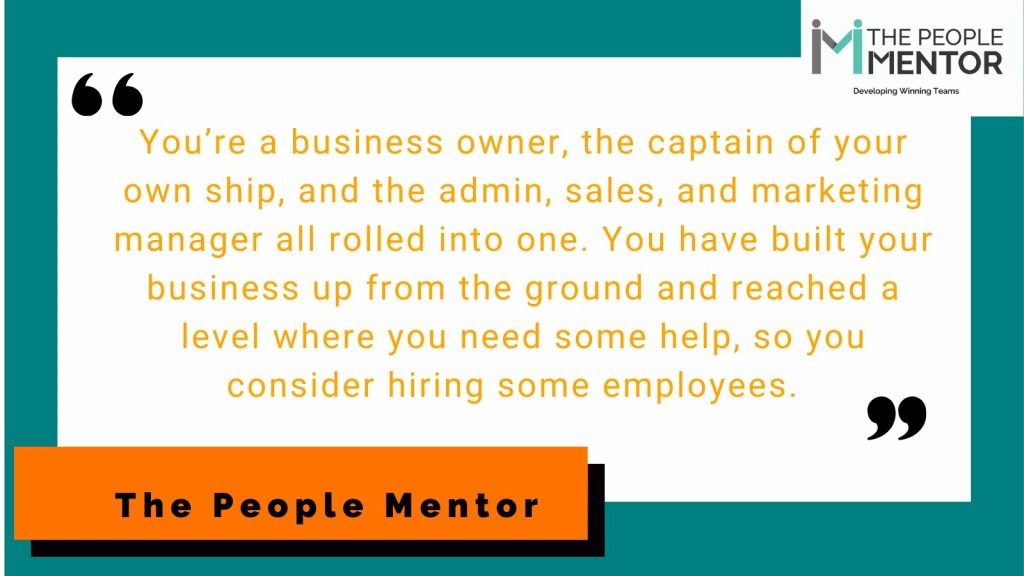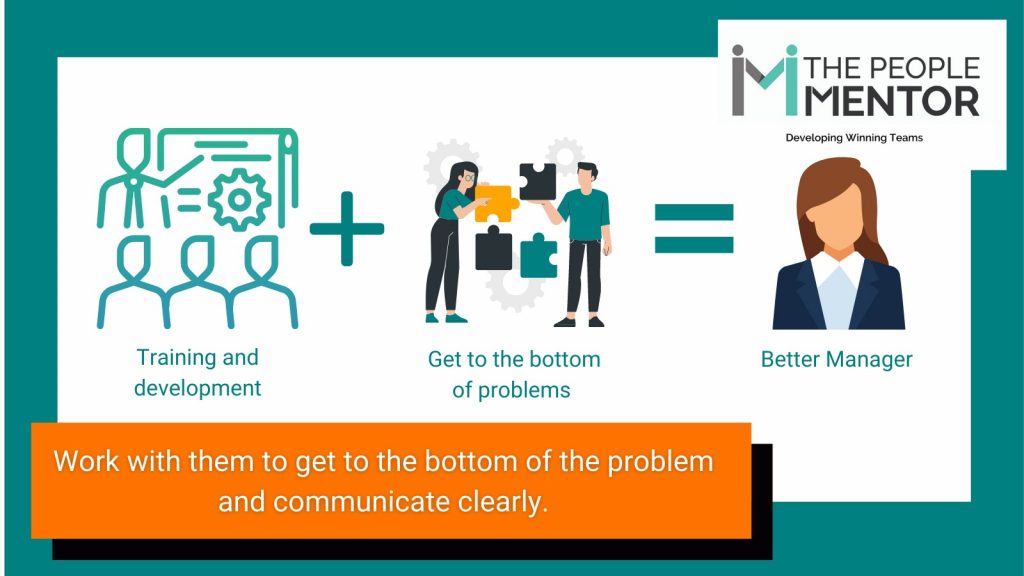Are you sitting comfortably? Welcome to my series of podcasts that will help you to navigate those inevitable difficult events at work that are part of being a manager.
Today I want to talk about managing people.
So you’re a business owner, the captain of your own ship, and the admin, sales, and marketing manager all rolled into one. You might have built your business up from the ground and reached a level where you need some help, so you consider hiring some employees.
Good employees will help you take your business to the next level, and managing them successfully is crucial.
But managing people can be the biggest challenge for business owners. As well as managing peoples’ emotions and different personalities, you need to know how to successfully deal with them if they have a problem, how to help them develop, and what to do if they aren’t performing well.
Bigger organisations have training teams or managers that can take employees through an induction so they know what is expected of them. When you’re a small to a medium business owner, the buck stops with you.

How do you successfully manage your employees while maintaining your sanity?
When an employee starts working with you, sit down with them over a cup of coffee and explain your business vision. Talk to them about what they aspire to do and think about how that fits your grand plans.
The next thing is to think about training and development.
It’s better for your business and for them if they are allowed to develop in a way that meets business needs and fits in with their learning style and aspirations.
You also can’t overlook the importance of making a personal connection with an employee too.
How are you going to check that everything is okay with them?
Talk to your employees every day, even if it’s only for a few minutes. If they feel that you’re there to support them and appreciate what they do, they’ll be more motivated to work hard for the business.
If your employee works remotely, don’t underestimate the value of an email or a message to ask how they are getting on.
Of course in work as in life, sometimes things aren’t okay. So you need a strategy in place to deal with problems when they arise. If there is a problem, have a one to one meeting with the employee and plan what you are going to say so you feel more in control.
Work with them to get to the bottom of the problem and communicate clearly.
Ask them for their account of what happened and explain what the consequences of repeat behaviour in the future might be. Do bear in mind though that all might not be as it seems when dealing with an employee who’s having problems. Are they late to work every day because they care for a relative or they’re a single parent with no one else to do the school run?
Make sure you identify what’s really going on.
It’s better to deal with employee problems as soon as they arise so you can offer support if it’s needed. Supporting an employee does take time but think about the commitment and loyalty you could get back, and think about what you would want if you were them. Nobody wants to feel like they’re ‘just a number.’
Effective listening doesn’t just apply when there are problems, it can be used in a very constructive way for the business. Listen to your employees and you might learn something. If they have opinions or ideas on what could be improved, listen to them and take them on board. If employees feel they are being heard and valued, they are more likely to be engaged and motivated to do well.
So what if you’ve found some great employees, how do you stop them from jumping ship?
Taking the time to get it right from the start is the answer. Give them a proper induction and think about assigning them a buddy if possible.
Make sure they have everything they need, like equipment and whatever’s necessary for them to be effective. There’s nothing worse than feeling nervous when you’re starting a new job only to find that you don’t know what you’re doing and you don’t know where anything is!
Combine an effective induction with a training and development plan, and you’ll be pleasantly surprised at how fast an employee will settle in. Add to that a personal connection and show them that they’re valued and you’ll have a very productive, loyal, and motivated employee.

Now for some extra tips…
As a small to a medium business owner, you get to manage your business and people more closely than a CEO of a huge organisation ever could. To make sure that this is a blessing and not a curse, here are some helpful tips.
Be a mentor.
Share your knowledge and expertise with your employees and find ways to let employees shine without undermining your authority or your goals.
Encourage a healthy work/life balance.
Encourage employees to take regular breaks and make sure they use their annual leave allowance. A well-rested and refreshed employee is a motivated and well-performing employee.
Reward a job well done.
You’re a small business so you might not have the budget of big companies to send employees on retreats and team-building days, but it doesn’t mean that you can’t reward hard work in your own way. Think about what you would like if you were in your employees’ shoes.
Managing people can be a minefield but it doesn’t have to be painful. Start as you mean to go on. Connect with them, appreciate them, and do your best to solve problems early, so your business reaches its goals and your people reach their potential.
I hope that you got some good tips from today’s podcast, and I’ll see you next time for the next one in the series. This is The People Mentor, signing off.
Want a helping hand, then have a look at the free resources.
Struggling and want to discuss how I can support you on your management and leadership journey, book an exploratory call.





